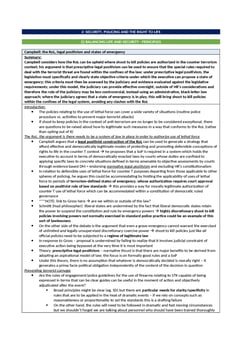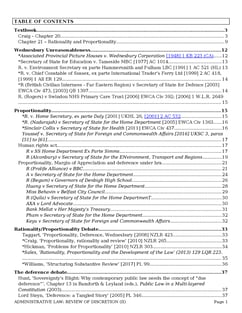Locabail v Bayfield [2000] QB 451
Judgement for the case Locabail v Bayfield
Table Of Contents
A recorder presiding over a case realised that his firm of solicitors was acting against the defendant in a separate case.
He disclosed this to both sides, and Defendant did not ask him to remove himself from the case, but demanded a retrial upon losing.
CA denied Defendant’s appeal, saying that partnership in a firm acting for clients whose success in litigation against Defendant's former husband might attract profit and goodwill did not give him a sufficient interest in the outcome of the proceedings before him either to attract the principle of automatic disqualification or to give rise to a real danger of bias.
FACTS
In a conjoined case, a barrister sitting as a recorder was presiding over a personal injury case and had written articles attacking PI defendants and their insurers.
-
CA held that while writing articles wouldn’t normally give rise to a fear of bias, the “intemperate” terms in which the recorder had expressed views critical of defendants and their insurers could have given rise to the possibility that in resolving the case he had favoured the claimant against the defendant; and that, accordingly, there was a real danger of bias which required the court to set aside his judgment and to order a retrial.
Judges generally will (and ought to) have views on their area of expertise that will colour their thinking in cases. The recorder shouldn’t have been punished simply for making those views public (in fact doing so gave Defendant an insight into his thinking and how it could most successfully proceed)
CA general statements
Where a judge had a direct personal interest, which was other than de minimis, in the outcome of proceedings bias was presumed to exist and he was automatically disqualified unless he gave full disclosure and the affected party consented to the judge’s hearing the case in unequivocal terms.
Where apparent bias was asserted it was for the reviewing court, personifying the reasonable man with knowledge of the relevant circumstances and adopting a broad approach, to assess whether there was a real danger of bias; that in making that assessment the court might properly inquire whether the judge knew of the matter relied on as undermining his impartiality, since ignorance would preclude its having influenced his mind and dispel any such danger.
For Further Study on Locabail v Bayfield
Need instant answers? Our AI exam tutor is here to help.
Ask questions 🙋 Get answers 📔 It's simple 👁️👄👁️
Our AI is educated by the highest scoring students across all subjects and schools. Join hundreds of your peers today.
Get StartedSimilar Cases
Related Product Samples
These product samples contain the same concepts we cover in this case.
| Criminal Justice, Security, & Human Rights | Fair Trial Rights And Secret Evidence Notes (117 pages) |


